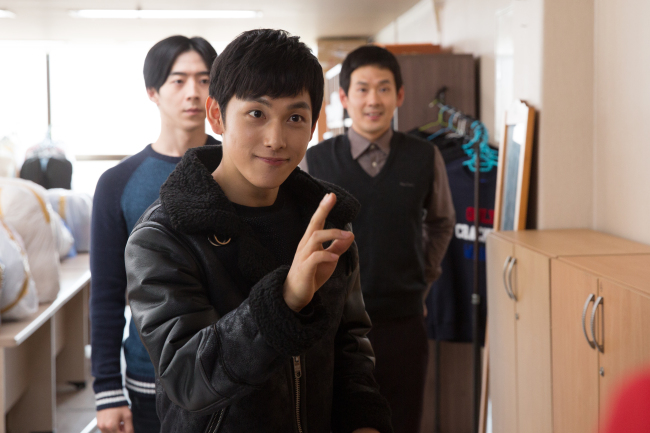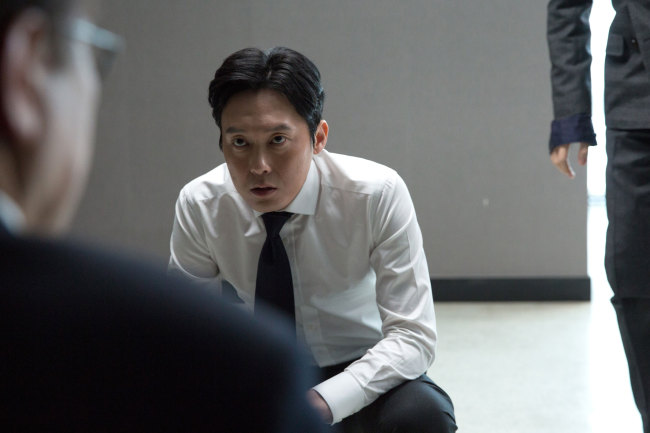[Herald Review] ‘One Line’ tries to discuss money, but falls short
Film struggles to analyze nature of wealth and problems of Korean economy in the early 2000s
By Rumy DooPublished : March 21, 2017 - 17:27
The new bank scam thriller “One Line” traces a very specific type of crime that emerged around 2005.
By then, Korea’s economy had recovered to a certain extent from the 1997 Asian financial crisis, but an uneasiness foreshadowed the soon-to-come global crisis of 2007. Locally, it was a period when the gap between the rich and poor widened and solidified, stirring up anger among those with less.
It was during this time that a group of scammers began to “rob” banks, according to director Yang Kyung-mo, by helping “the common people” who did not qualify for loans falsify documents so they could borrow money from banks. Acting as brokers, these scammers received a fee after their clients obtained their loans.
In “One Line,” Lee Min-jae, played by Im Si-wan, initially appears to be a helpless university student who, in need of quick cash, seeks out such loan brokerage services.
The head of the operation Jang Seok-goo, played by Jin Goo, is eager to help. Exuding a theatrical sort of charisma, Jang dons the mask of a gentleman. “I like doing things peacefully,” he says, distancing himself from thugs who take money from the poor. He prides himself on handing out justice -- he only helps the less fortunate claim what is theirs from the big bad banks.
Jang’s weapon is a book that contains the details of banks’ loan products. If Jang is the brain of the operation, his right-hand man Park Ji-won is the body, played with chilling force by Park Byung-eun. Park is more violent and more ambitious, single-mindedly pursuing money and power.
And so Jang helps the seemingly innocent collegian Min-jae falsify his job status -- complete with a suit and fake office number -- to score a loan.
It turns out, however, that Min-jae has been scheming to cheat the crooks -- he gets away without paying his brokerage fees. He has been amassing a large sum, running his own scam operation with the help of an art student friend adept at forging documents. Shifting away from his most well-known role as the heart-of-gold rookie office worker Jang Geu-rae in the 2014 TV series “Misaeng,” Im plays a con artist who takes full advantage of his honest face and those who trust him.
By then, Korea’s economy had recovered to a certain extent from the 1997 Asian financial crisis, but an uneasiness foreshadowed the soon-to-come global crisis of 2007. Locally, it was a period when the gap between the rich and poor widened and solidified, stirring up anger among those with less.
It was during this time that a group of scammers began to “rob” banks, according to director Yang Kyung-mo, by helping “the common people” who did not qualify for loans falsify documents so they could borrow money from banks. Acting as brokers, these scammers received a fee after their clients obtained their loans.
In “One Line,” Lee Min-jae, played by Im Si-wan, initially appears to be a helpless university student who, in need of quick cash, seeks out such loan brokerage services.
The head of the operation Jang Seok-goo, played by Jin Goo, is eager to help. Exuding a theatrical sort of charisma, Jang dons the mask of a gentleman. “I like doing things peacefully,” he says, distancing himself from thugs who take money from the poor. He prides himself on handing out justice -- he only helps the less fortunate claim what is theirs from the big bad banks.
Jang’s weapon is a book that contains the details of banks’ loan products. If Jang is the brain of the operation, his right-hand man Park Ji-won is the body, played with chilling force by Park Byung-eun. Park is more violent and more ambitious, single-mindedly pursuing money and power.
And so Jang helps the seemingly innocent collegian Min-jae falsify his job status -- complete with a suit and fake office number -- to score a loan.
It turns out, however, that Min-jae has been scheming to cheat the crooks -- he gets away without paying his brokerage fees. He has been amassing a large sum, running his own scam operation with the help of an art student friend adept at forging documents. Shifting away from his most well-known role as the heart-of-gold rookie office worker Jang Geu-rae in the 2014 TV series “Misaeng,” Im plays a con artist who takes full advantage of his honest face and those who trust him.


Jang, seeing potential in Min-jae’s skills of deceit and calculation, invites him to join his operation. When Jang is outed by the police, he retires with his bags of cash into a warehouse, vowing to keep his head low.
Min-jae and Jang’s former colleague Ji-won end up competing for prospective debtors, the former using the budding online system, personal charm and emotional manipulation, and the latter linking arms with the heads of big banks.
Intermittent scenes show that Min-jae comes from a family of abject poverty and is determined to escape it. The character transitions from student to shrewd con man, then grows a conscience when he sees how his scams have affected people’s lives. Some, unable to pay off their debts, hang themselves; others hurt themselves to repay debts with insurance claim payments, and still others have been tortured into paying by the ruthless Ji-won.

Director Yang had met with actual scammers prior to filming, he said at a press screening in Seoul Monday. “I was struck by how they believed they were helping others. It was their way of helping those who couldn’t get loans. I wanted to show the reality of the big system.”
But just as handing out loans to people cannot address the fundamental reasons of their poverty, this movie fails to tap into the systematic problems of the Korean economy at the time. It does struggle to examine the nature of money in a capitalist society. For some, like Min-jae’s family, it is a means for basic sustenance; for others, like Ji-won, it has become a religion -- the means, the end and the purpose of life.
Unfortunately, despite an intriguing setup, the film eventually circles back to the dichotomy of the poor and the rich, the good and the bad. It seems to want to probe deeper into the foundation of the Korean economy and the meaning of wealth, but comes up short.
The film hits local theaters on March 29.
By Rumy Doo (doo@heraldcorp.com)











![[Today’s K-pop] BTS pop-up event to come to Seoul](http://res.heraldm.com/phpwas/restmb_idxmake.php?idx=644&simg=/content/image/2024/04/17/20240417050734_0.jpg&u=)




![[KH Explains] Hyundai's full hybrid edge to pay off amid slow transition to pure EVs](http://res.heraldm.com/phpwas/restmb_idxmake.php?idx=652&simg=/content/image/2024/04/18/20240418050645_0.jpg&u=20240419100350)

